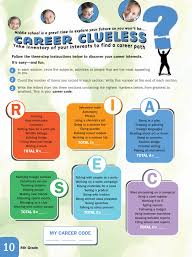
You must analyze your personality and interests when choosing a career. You can consult a career counselor to do this or take a career assessment test. The assessment should help you identify your strengths and interests and match them with the available opportunities. You should then use this information to create a list of potential career options that fit these qualities.
Goals
Setting goals is essential when selecting a career. These goals should have measurable numbers. They also need to be action-based. This means that you need to set a timeline for getting them done. Time is a finite resource. It's okay to have several goals, but your main focus should be on the one you're most interested in.
There are two types, short-term or long-term, of career goals. You can achieve short-term goals in the next few weeks or years. These goals are milestones and stepping stones for your long-term goals. To remain competitive, you need to set short-term and long-term goals. To keep yourself accountable, you should also write down your goals.
Type of personality
One of the best ways to make a career choice is to determine your personality type. Certain types of personality suit certain types of work, such as public relations or sales. These positions may not be suited for people who are shy. However, those who are confident and outgoing might do well. A personality test can help you determine your strengths and find the right career for you.

People with outgoing personalities will probably do best in small groups and will thrive in roles that involve interaction with people. These people may be more drawn to customer service or sales roles because they are required to interact with customers. However, people with introverted personalities may be more comfortable in an accounts payable position because it doesn't require much interaction with other people.
Interests
It's important that you consider your interests when choosing a job. Most people have one or two interests that are more prominent than the others. Write them down. Next, give each type of interest an identification code. These letters will allow you to search for suitable careers. You can use your interest code to help you find a job if you are naturally curious about a topic or technology.
If you are interested arts, design, or the humanities consider a career where your creativity is rewarded. Creativity and little structure are key to creative careers. Examples of creative careers are musicians, writers and artists. If you're looking for something more realistic, look into careers that require hard work as well as an ability to see the details.
Financial situation
The financial circumstances of your family can impact the choice of a career path. It is vital that you choose the career path that best suits your interests and skills. Some people choose the wrong career path early in life, which can lead to regret later. It is crucial to identify and write down your financial goals, no matter if they are five-year, ten year, or fifteen-year in nature.
Financial concerns are a factor in career decisions but they shouldn't be the only factor. It's impossible to predict the future, even in financially secure professions. It is not wise to choose a career that depends on financial security. You should carefully consider your personal circumstances.

Networking
If you're looking to advance your career, networking is an essential tool. Your visibility can be increased and you may land your dream job by creating networks. This can be a great way to secure your job and find new clients. This can help you get your dream job by referring others. Not only can you network outside of your company but also within your own company to get to know your peers. This will give recruiters a better idea of your strengths.
Networking refers to the sharing of information about careers, jobs and other opportunities. You can do it with your family or friends or via networking websites like LinkedIn. To meet professionals and get current information, you can join online discussion groups.